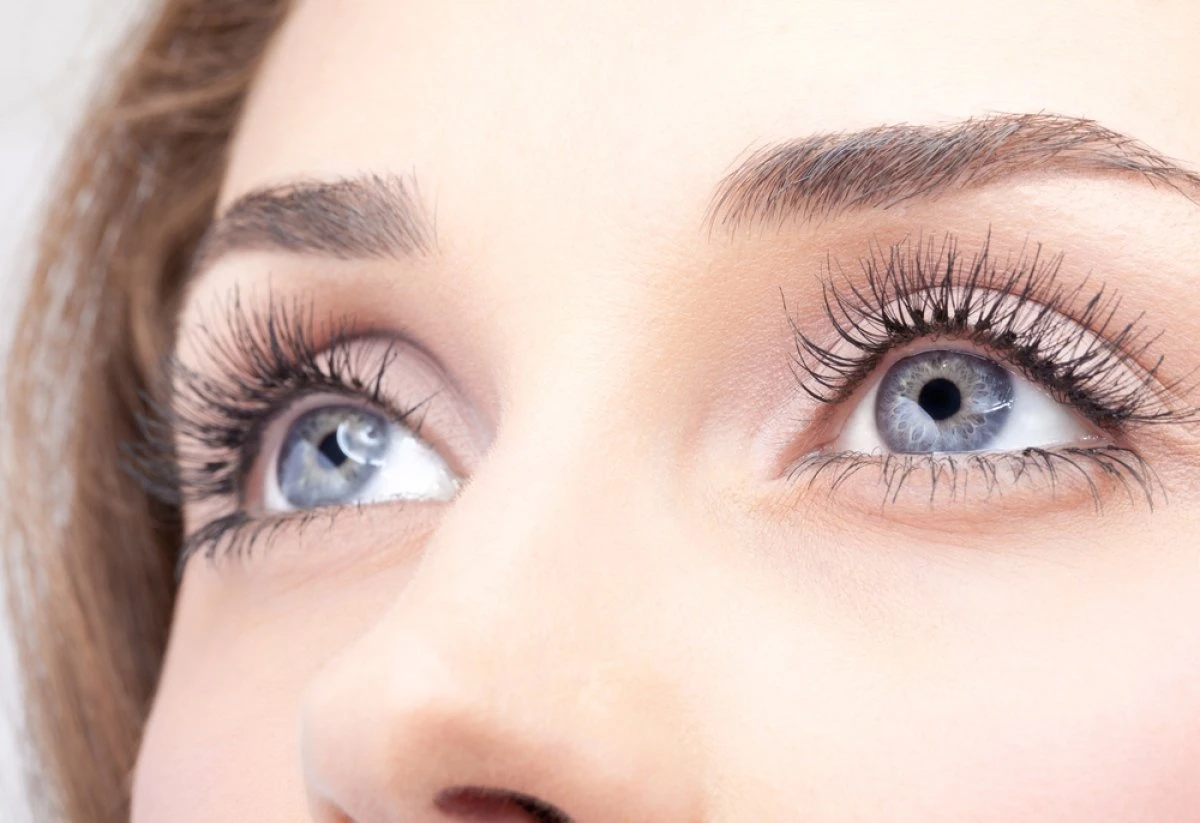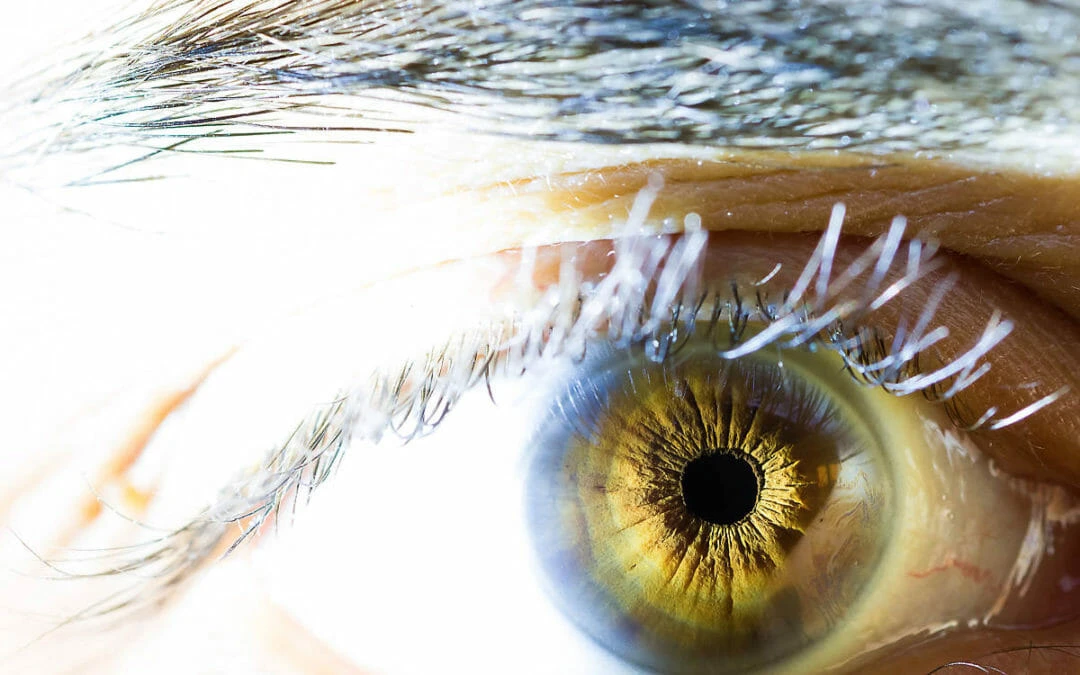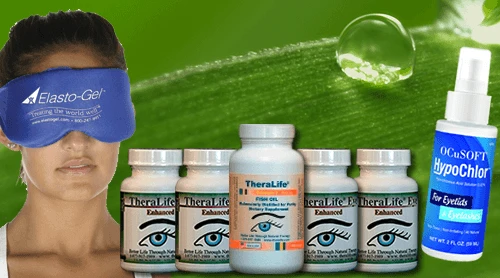Sleep is essential for overall health and well-being. Quality sleep can be compromised by several factors, including morning woes such as watery and crusty eyes when one wakes up.
This article provides an overview of the causes behind this common problem and its potential effects on physical health and offers advice on reducing its occurrence or severity.
Sleep deprivation has become increasingly commonplace in modern society, with many individuals struggling to achieve adequate restorative sleep due to environmental or lifestyle factors.
Experiencing watery and crusty eyes upon waking may also indicate poor sleep hygiene and should not be ignored.
What Causes Watery And Crusty Eyes In The Morning?
When you wake up, watery and crusty eyes are common for many people, as dry climate and poor sleep can often be the culprits.
Connection of Chronic Dry Eyes to Watery Eyes
The root cause of both watery and crusty eyes is chronic dry eyes.
When you produce too many tears, or when normal tear drainage is blocked, your eyes may get a little watery. The influx of tears can spill onto your eyelids and cheeks like you are crying. Is there anything you can do about it? Yes, depending on the cause.
Tears are essential for nourishment and lubrication of the human eye. Every time you blink, you wash your eyes with tears from the lacrimal glands in your upper eyelids. These glands will produce extra tears in response to irritation and inflammation. Tears usually drain out of the eye and into the nose through ducts in the corners of your eyes.
The causes of excess tears are the following:
- Dry-eye syndrome. It may not make sense, but dry-eye syndrome often leads to watery eyes. But people with watery eyes are usually experiencing an overproduction of tears, composed of water, oil, and mucous. When eyes dry out, they become irritated and uncomfortable. That prompts the lacrimal glands to produce so many tears that they overwhelm the eye’s natural drainage system. Tear production tends to lessen with age, so dry eyes are more common in older adults. Some medical conditions and medications can also lead to dryness, as can a dry and windy environment. But the most common cause of dry eye syndrome is a chronic condition called keratoconjunctivitis sicca (KCS). People with this condition make tears, but the tears do not contain enough water. In addition to excessive tearing, symptoms of dry eye syndrome may include blurred vision, itchy eyes, or burning eyes. One remedy for milder cases of dry eye is using over-the-counter artificial tears. Other treatments include prescription drugs.
The connection between Dry Eyes and Crusty Eyes (Blepharitis)
The tears are composed of water, oil, and mucus. When dry, irritated eyes stimulate tear production, the tears often contain excess mucus, which causes an unsightly discharge around your eyes. Dry, crusty, or stringy mucus in the corners of your eyes, primarily upon wakening, can be a sign of dry eye.
Blepharitis is a common eye condition that makes eyelids red, swollen, irritated, and itchy. It can cause crusty dandruff-like flakes on your eyelashes.
Blepharitis can be uncomfortable. But it isn’t contagious and usually doesn’t cause any lasting damage to your eyes.
The primary treatment for blepharitis is regularly cleaning your eyelids and keeping them free of crusts. Blepharitis usually doesn’t go away completely, but you can take steps to manage your symptoms.
What causes crusty eyes? (blepharitis)
Most of the time, blepharitis happens because you have too much bacteria on your eyelids at the base of your eyelashes. Bacteria on your skin is normal, but too much bacteria can cause problems. You can also get blepharitis if the oil glands in your eyelids get clogged or irritated.
- Dry eye. Oil and flakes can build up in your tear film (a thin layer of tears across the surface of your eye), making your eyes feel dry. Or your eyes may feel watery or teary because your tears aren’t working correctly. Learn more about dry eye.
Treatment for Watery and Crusty E yes
Lack of Sleep
The antediluvian idea of restful slumber is still relevant today, with its effects on physical health being more far-reaching than initially thought.
In terms of eye health specifically, it has been found that reduced sleep may cause your eyes to become red or watery in the morning due to dehydration – this can also lead to a build-up of bacteria around the eyelids which causes further irritation.
To combat this, using eye drops regularly can help reduce inflammation and promote better hydration in the long run.
Also, living in arid climates can contribute to these issues; exposure to dry air outside combined with warm air inside from heating systems can act like a double whammy for sensitive eyes!
Therefore, investing in a humidifier might be worth considering if you live in such areas – doing so will add extra moisture to the environment during winter months (and beyond).
With proper care and attention given to one’s sleeping habits and home environment, we may wake up refreshed and free from pesky morning woes.
The Effects Of Poor Sleep On Physical Health
Watery and crusty eyes in the morning are from poor sleep. Poor quality sleep can affect our mental well-being and impair physical health, making it more challenging to manage daily tasks and activities of living.
The impact of inadequate restorative sleep on overall well-being is significant:
* Sleep deprivation increases the risk of obesity, heart disease, stroke, depression, anxiety, diabetes, and other chronic conditions
* Impaired cognitive performance and decreased alertness
* Reduced immune system strength leading to increased vulnerability to infections
* Decreased libido and reproductive function
* Increased sensitivity to pain and reduced ability to cope with stress
* Altered metabolism that may lead to weight gain or loss due to changes in appetite-controlling hormones
Allergy testing identifies potential causes of poor sleep quality, such as dust mites, mold spores, or pet dander, which could trigger an allergic reaction when inhaled during sleep.
Stress management techniques can minimize any underlying factors contributing to disturbed slumber.
Reducing exposure to allergens through preventive measures like allergen-proof bedding, air purifiers, or vacuuming regularly can help reduce symptoms associated with allergies, including watery eyes upon waking.
Reducing Exposure To Allergens
Sleep health is affected by exposure to allergens. Dust mites, pet dander, and other environmental factors can cause various symptoms that make it challenging to get the restful sleep needed for good physical and mental well-being. Avoiding or minimizing contact with these irritants may help reduce morning woes, such as watery and crusty eyes when you wake up.
People can take several preventive measures to avoid allergens in their homes. Vacuuming regularly using a vacuum cleaner equipped with an appropriate filter will help remove dust particles from carpets and mattresses. Washing bedding on a hot cycle at least once per week will help kill dust mites, while regular cleaning of floors, walls, and furniture surfaces with a damp cloth rather than dry-dusting, which only stirs up more allergens into the air.
Additionally, those with pets should keep them out of the bedroom during sleeping hours and possibly even bathe them weekly to minimize shedding of fur and dander around the house.
Finally, limiting activities that result in excessive stirring of indoor air, like smoking indoors or burning scented candles, can also minimize irritation caused by airborne particulates. By taking allergen avoidance seriously through preventive measures, people can improve their sleep quality without suffering from common morning woes like watery and crusty eyes upon waking.
With improved control over one’s environment, individuals can look forward to better restorative sleep each night, leading to increased energy levels and overall well-being throughout the day ahead.
Maintaining A Regular Sleep Schedule
It is essential to reduce exposure to allergens, such as avoiding outdoor activity during peak pollen hours and using air purifiers in the home. However, a regular sleep schedule can also help prevent morning woes associated with watery and crusty eyes.
Enforcing discipline when it comes to bedtime helps regulate body temperature and hormone levels for better rest. Here are some tips for maintaining a consistent sleep routine:
* Set an alarm that reminds you of your desired bedtime each day.
* Develop calming rituals before going to bed, like reading or taking warm showers.
* Avoid caffeine consumption after noon.
* Keep electronics out of the bedroom; limit their use to two hours before sleep.
* Regulate the environment by keeping the room dark, quiet, and cool (around 65°F).
By adhering to these guidelines, individuals can combat eye irritation upon waking by establishing healthy lifestyle habits around sleeping patterns. The next step is creating a bedtime routine that will provide consistent slumber night after night.
Creating A Bedtime Routine
Establishing a Sleep Schedule:
A consistent sleep schedule is essential for feeling well-rested and energized the following day.
Creating a Relaxing Environment:
Consider adjusting the bedroom’s lighting, temperature, and noise level to create an optimal sleep environment.
Calming the Mind & Body:
Before bedtime, engage in calming activities such as reading, stretching, or journaling to relax the mind and body.
Establishing A Sleep Schedule
Establishing a regular sleep schedule is essential to creating and maintaining a bedtime routine.
Setting goals for the quantity and quality of your sleep can help you determine what time to fall asleep each night and when it is best to wake up in the morning.
Additionally, tracking your sleep can provide helpful information about how much restorative sleep you get daily.
This data also gives insight into whether or not adjustments can ensure adequate amounts of sleep each night.
It is important to remember that regularity is critical when establishing a successful bedtime routine; going to bed at the same time each evening and waking up around the same hour each morning will create a reliable pattern of healthy sleeping habits.
It is, ultimately, making sure that enough hours of restful sleep.
Creating A Relaxing Environment
Creating a relaxing environment is essential to establishing and maintaining an effective bedtime routine.
As they prepare for sleep, the atmosphere surrounding the individual should be relaxed, allowing them to drift off into slumber easily.
Various calming activities can create this serene setting, including relaxation techniques such as deep breathing exercises or progressive muscle relaxation.
Additionally, lighting adjustments within the bedroom by dimming lamps or using nightlights to promote feelings of comfort and safety while falling asleep will help.
With these modifications, the space will become one that encourages healthy sleeping habits and allows for a peaceful transition into dreamland each evening.
Calming The Mind & Body
In addition to creating a relaxing environment, calming the mind and body is essential for establishing an effective bedtime routine.
Natural remedies such as herbal teas or homeopathic tinctures can help clear their minds of intrusive thoughts before settling into slumber.
Such meditative activities include guided relaxation exercises focusing on deep breathing techniques and visualization of tranquil scenes.
With these forms of mental and physical preparation, individuals will experience improved quality of rest each night while also being better equipped to handle any challenges they may face during the day ahead.
Adjusting The Bedroom Environment
The bedroom environment can influence the quality of sleep and wakefulness. Humidity levels, air circulation, and air purification are essential to reduce morning woes, such as watery or crusty eyes upon waking.
The ideal relative Humidity should be between 30-50%. Too low Humidity can lead to nasal congestion and dryness in the throat and eyes. A humidifier may help alleviate symptoms associated with low Humidity by adding moisture back into the air.
Air circulation helps move fresh air around a room, which assists in eliminating dust particles, pollen, mold spores, dander from pets, and other airborne allergens that could be triggering allergies or asthma attacks during sleep. Air purifiers also work to filter out these pollutants from the atmosphere for better breathing throughout the night cycle. Furthermore, it is beneficial to open windows occasionally for natural ventilation whenever possible.
By making adjustments to the bedroom environment through monitoring humidity levels, ensuring proper air circulation, and using an air purifier if necessary, individuals may find relief from their morning woes, such as watery or crusty eyes when they wake up.
Careful consideration of dietary considerations for better sleep is essential to improve overall health and wellness.
Dietary Considerations For Better Sleep
The bedroom environment is a crucial factor for obtaining restful sleep; however, diet can also influence the quality of sleep. By focusing on dietary habits and nutrient intake, one may experience better sleep and fewer morning woes, such as watery or crusty eyes when one wakes up.
To help improve eye fatigue and reduce morning discomfort:
1. Cut back on caffeine consumption to avoid dehydration. That can cause dryness around the eyes.
2. Increase your intake of foods rich in fatty acids, like fish, nuts, and seeds, which help lubricate both inside and outside of the eyelids.
3. Avoid intense lighting at night time by using low-wattage bulbs instead of bright ones while you eat dinner or play games before bedtime.
These changes are necessary when adjusting daily routines; however, seeking professional medical advice is always best if symptoms persist.
The next step is to consider how certain lifestyle practices affect our daily ability to obtain high-quality sleep.
Seeking Professional Medical Advice
Sleep disorders and insufficient sleep can lead to morning woes, such as watery and crusty eyes when waking up. Eye exams can help those with ongoing symptoms the underlying conditions like dry eye syndrome or blepharitis.
It is important to take steps towards improving overall sleep hygiene in order to get adequate rest and reduce the occurrence of these symptoms. Establishing a regular bedtime routine, including avoiding screens before bed, exercising regularly throughout the day, keeping the bedroom cool and dark, eating light meals at night, and ensuring no distractions during sleep can help improve one’s sleep quality.
Additionally, limiting caffeine intake later in the afternoon or evening will help. Considering these steps can significantly reduce the chances of experiencing morning woes upon waking up each day.
Frequently Asked Questions
How Can I Reduce My Exposure To Allergens?
Reducing exposure to allergens is a crucial component of optimal sleep health.
Allergen-proofing a home by reducing dusting, avoiding pets if possible, and minimizing pollen levels can significantly help individuals with allergies or asthma.
Additionally, changing laundry detergents and using less fabric softener may also be beneficial in reducing allergen-related symptoms such as watery or crusty eyes when waking up.
What Diet Changes Can I Make To Improve My Sleep?
Improved sleep hygiene is an essential part of maintaining healthy well-being.
Dietary changes such as allergen avoidance can play a role in helping to obtain better quality sleep, thus promoting healthier morning routines.
Allergens present in the bedroom environment or foods consumed before sleeping can contribute to poor sleep.
Eating smaller meals closer to bedtime may also help improve sleep quality by reducing night-time indigestion.
Consuming adequate amounts of vitamins and minerals throughout the day will ensure your body has enough energy for restful nights.
What Type Of Bedtime Routine Should I Create?
Creating a bedtime routine to improve sleep quality is essential to getting sufficient rest.
A regular exercise regimen and adequate hydration are essential components of this ritual. Do regular physical activity for several hours before attempting to sleep, as the increased energy can make it difficult for the body to relax into slumber.
Drinking plenty of water throughout the day helps ensure that dehydration does not interfere with falling asleep or staying asleep during the night.
Additionally, a consistent time when winding down each evening helps signal your body that it’s time for rest – this could involve taking a bath, reading a book, or listening to calming music.
The goal is to create enough structure and consistency so that after some practice, your body will naturally drift off at the same time every night without difficulty.
What Do I Need To Do To Adjust My Bedroom Environment?
Achieving a comfortable bedroom environment is an integral part of sleep hygiene.
Factors such as humidity levels, temperature control, dust mites, and blue light can all affect your ability to get quality sleep.
Adjust for these variables in the bedroom environment to reduce morning woes associated with watery and crusty eyes when you wake up – by ensuring that humidity levels are not too high or low, cooling down the room or using fans to achieve the desired temperature, regularly vacuuming to eliminate dust mites from carpets and furniture, and covering devices emitting blue light before bedtime.
Additionally, eye drops may help reduce discomfort upon waking.
What Professional Medical Advice Should I Seek For Morning Eye Issues?
Dry eyes and eye irritation are common morning woes that various environmental factors can cause.
Those who experience these symptoms should seek professional medical advice to help determine the underlying cause of their discomfort.
Treatment may involve lifestyle changes, such as adjusting the bedroom environment or using lubricating drops or ointments, along with other strategies recommended by your healthcare provider.
Additionally, consulting an ophthalmologist is advised if dry eyes become chronic and do not respond to other treatments.
Conclusion
The morning can be difficult for those suffering from watery and crusty eyes when they wake up. The cause can often be hard to pinpoint. Despite this difficulty, however, there are steps that one can take to combat these eye issues.
Reduce exposure to allergens as much as possible by creating an allergen-free bedroom environment. Dietary changes may also help improve sleep quality, while bedtime routines provide structure toward healthier sleeping habits. Lastly, seeking medical advice is essential in identifying any underlying causes of morning eye issues.
Individuals with morning eye problems can enjoy restful nights and comfortable mornings again by taking the proper steps and listening to sound medical advice.





